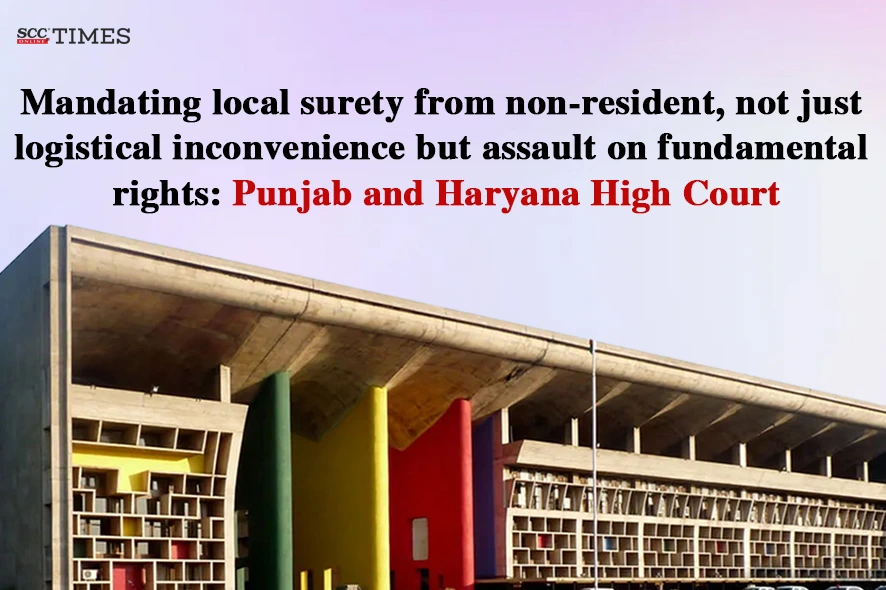Punjab and Haryana High Court: In the present case, a petition was filed by the petitioners-residents of Kolkata, under Section 482 of the Code of Criminal Procedure, 1973 (‘CrPC’) seeking quashing of FIR under Sections 120-B, 419, 420, 467, 468 and 471 of the Penal Code, 1860 (‘IPC’) as they were alleged of producing forged documents in relation to their bail. A Single Judge Bench of Sumeet Goel, J., held that there was no involvement of petitioners in the preparation of the fake documents of the local sureties in Gurugram. Further, the Court observed that mandating furnishing of a local surety from a non-resident was not merely a logistical but a profound assault on fundamental rights and such imposition was a de facto denial of right to bail.
Accordingly, the Court quashed the FIR and all consequential proceedings against the petitioners. However, it stated that the proceedings against the sureties would continue in accordance with the law.
Background
The petitioners were permanent residents of Kolkata and were residing there for 45 years. They were former Directors of Dee Kartavya Finance Ltd. and had been arraigned as accused in two cases, filed by Moneywise Financial Services Pvt. Ltd, under Section 138 of the Negotiable Instruments Act, 1881 (‘NI Act’) and the same were pending before the Judicial Magistrate First Class, Gurugram.
The petitioners had appeared before the Trial Court and furnished personal bonds of Rs 50,000 each. However, they could not arrange sureties themselves because they were outsiders and upon the assurance of their counsel, they relied upon two persons. Thereafter, the bail bonds along with the Aadhaar cards of the said sureties were furnished. Upon verification and scrutiny, the said documents were found to be forged, and the Trial Court took cognizance of it and directed the Station House Officer (‘SHO’) concerned under Section 156(3) of the CrPC to investigate the matter. Simultaneously, the petitioners were permitted to furnish fresh personal bonds.
Based on these set of allegations, the FIR was registered against the sureties as well as the petitioners under Sections 120-B, 419, 420, 467, 468 and 471 of the IPC. Thus, the petitioners approached this Court.
The petitioners contended that the FIR against them was a clear abuse of process of law and continuation of proceedings would result in miscarriage of justice. Per Contra, the respondent argued that the forged documents were submitted by the petitioners in relation to their bail and hence they could not escape the liability. It was further contended that the plea regarding the defense of ignorance and reliance upon the counsel was a matter of trial.
Analysis and Decision
The Court stated that the enduring plight of an accused person, particularly the ones compelled to traverse vast distances to appear in criminal proceedings and satisfy conditions of bail, remained a regrettable lacuna in our legal system. Further, the Court emphasized that the said unfortunate situation was exacerbated by the obsolete practice of Courts demanding local sureties as a prerequisite for release of bail.
The Court opined that the mandate of furnishing a local surety from an individual who was a resident of another district or State was not merely a logistical inconvenience but was a profound assault on fundamental rights and was more or less an imposition of an undue condition which was in itself a de facto denial of the right to bail. The Court further specified that such practice created an unnecessary dichotomy where an individual from one part of the country was treated differently from another, simply by the dint of his or her residence.
The Court opined that the continued insistence on local sureties was a judicial anachronism that flew in the face of Constitutional principles and the dictates of common sense as it inevitably endangered an infinite ingress of actions undertaken by a person to secure such local surety by all and any means to satisfy an illogical tenet of practice. The Court further emphasized that it was not oblivious to the fact that this practice often gave rise to precarious and unethical arrangements to an extent that it was subverted when the bond was based on a transactional arrangement rather than procedural acquaintance of trust.
The Court stated that it had dual responsibility to uphold rule of law and to ensure that justice remained relevant and responsive to the dynamic conditions of society. In the present case, the Court opined that it could not be said that the petitioners were complicit in the offences firming the subject matter of the said FIR. Further, the Court observed that the offences of cheating, dishonest inducement, forgery with intent to cheat and using forged documents as genuine were predicated upon the existence of a culpable mental state as an indispensable ingredient and the case at hand revealed a conspicuous absence of any mens rea that could be legitimately imputed to the petitioners. Therefore, the Court held that the present case was devoid of any indica of dishonest or fraudulent intent on the part of the petitioners.
Regarding criminal conspiracy, the Court specified that it mandated a prior meeting of minds to perpetrate a criminal act, however, it was not found in the case at hand as there was complete disconnect between the petitioners and the sureties. The Court opined that the Trial Court’s decision was a powerful judicial support that the culpability of the petitioners was tenuous since the petitioners were in no way involved with the preparation of the said fake documents.
Therefore, the Court allowed the petition and quashed the FIR concerned and all consequential proceedings arising therefrom against the petitioners. The Court further stated that the proceedings against the sureties would continue in accordance with law.
[Sumit Sharma v. State of Haryana, 2025 SCC OnLine P&H 7969, decided on 17-9-2025]
Advocates who appeared in this case:
For the Petitioners: Rohit Madan, Advocate
For the Respondents: Vishal Singh, AAG Haryana




